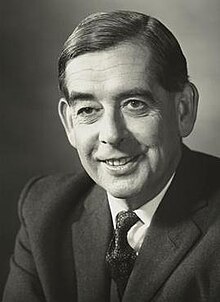Anthony Chenevix-Trench
| Anthony Chenevix-Trench | |
|---|---|
 |
|
| Born |
10 May 1919 Kasauli, British India |
| Died | 21 June 1979 (aged 60) Fettes College, Edinburgh, Scotland |
| Nationality | British |
| Occupation | Schoolmaster |
| Known for | Headmaster of Bradfield College, Eton College and Fettes College |
Anthony Chenevix-Trench (10 May 1919 – 21 June 1979) was a British schoolteacher and Classics scholar. He was born in British India, educated at Shrewsbury School and Christ Church, Oxford, and served in the Second World War as an artillery officer with British Indian units in Malaya. Captured by the Japanese in Singapore, he was forced to work on the Burma Railway.
He taught Classics at Shrewsbury School, where he became housemaster, and for a year at Christ Church. He was headmaster of Bradfield College, where he raised academic standards and instituted a substantial programme of new building works. Appointed headmaster of Eton College in 1963, he broadened the curriculum immensely and introduced a greater focus on achieving strong examination results, but was asked to leave in 1969 after disagreements with housemasters and an unpopular attitude to caning, which became the subject of a press controversy after his death.
Following a one-year break during which he taught for one term at the prep school Swanbourne House, he was appointed headmaster of Fettes College, where he succeeded in greatly increasing enrolment and in reforming the harsh traditional atmosphere of the school. He died while still headmaster there.
He was the son of Charles Godfrey Chenevix Trench (1877–1964) and Margaret May Blakesley. His father worked in the Imperial Civil Service in India. His great-grandfather was Richard Chenevix Trench (1807–1886),Archbishop of Dublin.
Anthony Chenevix-Trench, born at Kasauli on 10 May 1919, was the youngest of four sons born to the couple, the older ones being Christopher, Richard and Godfrey. In the first few years of his life the family visited Britain and various other countries, returning to India in 1922 where his father worked as part of a three-man commission in the picturesque city of Udaipur making recommendations on the vexed issue of land reform in the Rajput state of Mewar. Anthony was to spend three years in India, living in traditional colonial luxury with a staff of twelve including an English nanny and an Indian ayah, riding with the Mewar state cavalry on his pony while wearing a lancer's uniform tailored down to his size, and moving to the foothills of the Himalayas to avoid the heat of the summer.
...
Wikipedia
